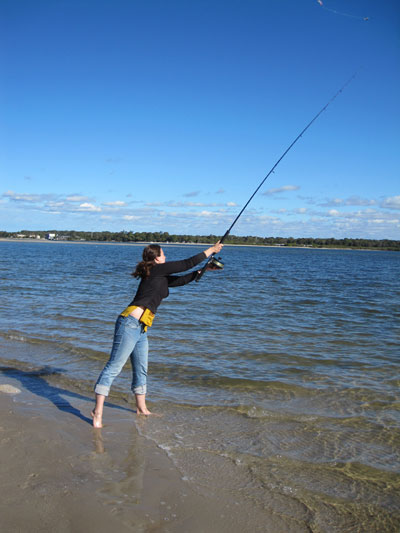By Definition, Useful
Add Summary

Blogger: Abigail Lynch, a doctoral candidate in the Department of Fisheries and Wildlife and a CSIS member, blogs from Down Under -- she's in Australia to build a framework for her dissertation research. She's interested in developing a decision-support tool to regulate harvest management strategies for lake whitefish in a changing climate.
By Definition, Useful
Wednesday, June 22, 2011
My two talks with Anthony Richardson have been particularly project-specific. I think this may be because Ant’s research most closely aligns with what I’m hoping to do but also because he has a very detail-oriented, linear process of discussing things and an inquisitive mind. Both meetings have proven very beneficial in helping me set the framework for my project and both meetings have left me intimidated by the monumental task that I’ve put in front of myself…through my hesitation, consternation and convoluted discussion of my project, Ant has been able to tease apart that it’s likely that I will probably be looking to take standard stock-recruitment relationship and account for environmental variables related to climate change. It’ll be important to start meeting with managers, stakeholders, and interested parties on a one-on-one basis until I have a more concrete conception of what my project will accomplish. From there, Ant recommended that I might be able to hold a more formal meeting with the same group of individuals with goals and directed outcomes from the interaction.
 Ant also called me out on my use of the word “useful.” I’m not sure I will ever be able to use that useful word (:D) in so glib a manner again. I had merely said that “I want my work to be useful.” By which I meant that I want it to be useful to managers in managing fisheries. However, Ant was quick to point out that studies, particularly modeling studies, can be useful in terms of an exercise because they can highlight, for example, uncertainty in a given estimate by providing drastically different results. While this may not be particularly useful on a management level, it is definitely useful in informing management and informing the science which can direct management. There is, however, more to science than just making a management decision.
Ant also called me out on my use of the word “useful.” I’m not sure I will ever be able to use that useful word (:D) in so glib a manner again. I had merely said that “I want my work to be useful.” By which I meant that I want it to be useful to managers in managing fisheries. However, Ant was quick to point out that studies, particularly modeling studies, can be useful in terms of an exercise because they can highlight, for example, uncertainty in a given estimate by providing drastically different results. While this may not be particularly useful on a management level, it is definitely useful in informing management and informing the science which can direct management. There is, however, more to science than just making a management decision.
Following our morning discussion, Ant invited me to sit in on a newly formed group meeting with him, You-Gan Wang, and Peter Baxter. The group is based in the UQ School of Mathematics and Physics but the collaboration is loosely formed around statistical modeling of natural resources (aquatic and terrestrial). It was a striking comparison, sitting in on this group meeting compared to yesterday’s meeting; mostly, because this group doesn’t yet seem to be grounded in a “mission” or a “focus” like the Environmental Decisions Group and also because the group is so nascent. I was witnessing two very different stages of academic collaboration -- one with a promising vision and one already running like an oiled machine.
Lynch's studies are supported by a William W. and Evelyn M. Taylor Endowed Fellowship for International Engagement in Coupled Human and Natural Systems, an International Studies and Programs Predissertation Award, an Ecology, Evolutionary Biology, and Behavior Summer Fellowship, a Graduate School Research Enhancement Award, and a travel award from



 Print
Print Email
Email




